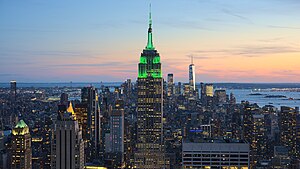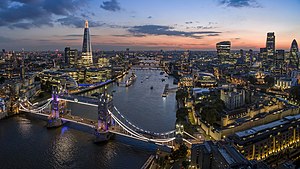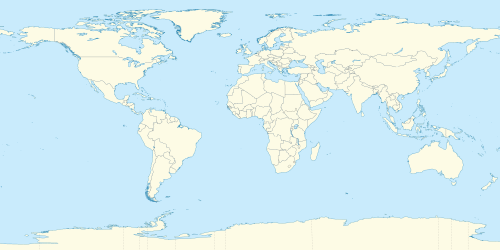Global city
Aglobal city,also known as apower city,world city,Alpha city,orworld center,is acitythat serves as a primary node in theglobal economic network.The concept originates fromgeographyandurban studies,based on the thesis thatglobalizationhas created a hierarchy of strategicgeographic locationswith varying degrees of influence overfinance,trade,andcultureworldwide.[1]The global city represents the most complex and significant hub within the international system, characterized by links binding it to other cities that have direct, tangible effects on globalsocioeconomicaffairs.[2]
The criteria of a global city vary depending on the source.[3]Common features include a high degree ofurban development,a large population, the presence of majormultinational companies,a significant and globalizedfinancial sector,a well-developed and internationally linkedtransportation infrastructure,local or national economic dominance, high quality educational andresearch institutions,and a globally influential output of ideas, innovations, or cultural products. Quintessential examples, based on most indices and research, includeNew York City,London,Paris,andTokyo.
Origin and terminology
The term 'global city' was popularized bysociologistSaskia Sassenin her 1991 book,The Global City: New York, London, Tokyo.[4]Before then, other terms were used for urban centers with roughly the same features. The term 'world city', meaning a city heavily involved in global trade, appeared in a May 1886 description ofLiverpool,byThe Illustrated London News;[5]British sociologist andgeographerPatrick Geddesused the term in 1915.[6]The term 'megacity' entered common use in the late 19th or early 20th century, the earliest known example being a publication by theUniversity of Texasin 1904.[7]In the 21st century, the terms are usually focused on a city'sfinancial powerandhigh technologyinfrastructure.[8][9]
Criteria

Competing groups have devised competing means to classify and rank world cities and to distinguish them from other cities.[6]Although there is a consensus on the leading world cities,[11]the chosen criteria affect which other cities are included.[6]Selection criteria may be based on a yardstick value (e.g., if the producer-service sector is the largest sector then cityXis a world city)[6]or on an imminent determination (if the producer-service sector of cityXis greater than the combined producer-service sectors ofNother cities then cityXis a world city.)[6]Although criteria are variable and fluid, typical characteristics of world cities include:[12]
- The most prominent criterion has been providing a variety ofinternational financial services,[13]notably infinance, insurance, real estate,banking,accountancy,andmarketing;and their amalgamation of financial headquarters, astock exchange,and other major financial institutions,
- Headquartersof numerousmultinational corporations,
- Domination of the trade and economy of a large surrounding area,
- Major manufacturing centers withportandcontainerfacilities,
- Considerabledecision-making powerdaily and at a global level,
- Centers of new ideas andinnovationin business, economics, and culture,
- Centers ofdigitaland other media and communications forglobal networks,
- The dominance of the national region with great international significance,
- The high percentage of residents employed in theservices sectorandinformation sector,
- High-quality educational institutions, including renowned universities andresearchfacilities; and attracting international student attendance,[14]
- Multi-functionalinfrastructureoffering some of the best legal, medical, and entertainment facilities in the country,
- High diversity in language, culture, religion, and ideologies.
General rankings
Global city rankings are numerous.[15]New York City,London,Tokyo,andParisare the most commonly mentioned.[16][17]
GaWC study
Jon Beaverstock,Richard G. Smith,andPeter J. Taylorestablished theGlobalization and World Cities Research Network(GaWC). They rank world cities by their connectivity through four "advanced producer services": accountancy, advertising, banking/finance, and law.[11]The GaWC inventory identifies three levels of global cities and several sub-ranks,[19]although the authors caution that "concern for city rankings operates againstthe spirit of the GaWC project"[emphasis in original].[20]The 2004 rankings added several new indicators while continuing to rank city-economicsmore heavily than political and cultural factors. The 2008 version of the list, similar to the 1998 version, is sorted into categories of Alpha world cities (with four sub-categories), Beta world cities (three sub-categories), Gamma world cities (three sub-categories), and cities with High sufficiency and Sufficiency presence. The cities in the top three classifications in the 2022 edition are:[21]
Alpha ++
Alpha +
Alpha
Global Cities Index (Kearney)
In 2008, the American journalForeign Policy,working with the consulting firmA.T. Kearneyand theChicago Council on Global Affairs,published a ranking of global cities based on consultation withSaskia Sassen,Witold Rybczynski,and others.[22]Foreign Policynoted that "the world's biggest, most interconnected cities help set global agendas, weather transnational dangers, and serve as the hubs of global integration. They are the engines of growth for their countries and the gateways to the resources of their regions."[23]The ranking is based on 27 metrics across five dimensions: business activity,human capital,information exchange, cultural experience, and political engagement.[24]Since 2015, it has been published with a separate index, the Global Cities Outlook, which is a projection of a city's potential based on rate of change in 13 indicators across four dimensions: personal well-being, economics, innovation, and governance. The top ranked cities in 2023 are:[25]
Global Cities Index (Oxford Economics)
Advisory firmOxford Economicsreleased its Global Cities Index in 2024, ranking the world's largest 1,000 cities based on 27 indicators across five categories (economics,human capital,quality of life,environment, andgovernance) with more weight on economic factors. The top ranked cities in 2024 are:[26]
Global Economic Power Index
The Global Economic Power Index reflecting three dimensions of economic power was introduced in 2012.[27]In 2015, the second Global Economic Power Index, a meta list compiled byRichard Florida,was published byThe Atlantic(distinct from a namesake list[28]published by theMartin Prosperity Institute), with city composite rank based on five other lists.[28][29]The top global cities in 2015 are:
Global Power City Index
The Tokyo-based Institute for Urban Strategies at The Mori Memorial Foundation, issued a study of global cities in 2008. They are ranked in six categories: economy, research and development, cultural interaction,livability,environment, and accessibility, with 70 individual indicators among them. The top ten world cities are also ranked by subjective categories, including manager, researcher, artist, visitor and resident.[30][31]The top 10 cities in 2023 are:[30]
Financial rankings
Global Financial Centres Index
Strength as afinancial centerhas become one of the pre-eminent indicators of a global city's ranking. As of 2024,[32]the cities representing the top ten financial centers according to theGlobal Financial Centres Indexby the think tankChina Development Instituteand analytics firmZ/Yenare:[33]
The Wealth Report
Estate agentKnight Frank LLPand theCiti Private BankpublishThe Wealth Report,which includes a "Global Cities Survey", evaluating the most important cities tohigh-net-worth individuals(HNWIs, having over $25 million of investable assets each). Criteria are economic activity,political power,knowledge and influence, and quality of life.[34][35]The most important cities to UHNWIs in 2022 are:[36]
Social rankings
The World's Most Talked About Cities
London-basedbuilt environmentcommunications firm ING Media ranked 250 cities by total online mentions acrosssocial mediaand online news. A fifth of digital mentions were for Tokyo, New York City, London, and Paris, identifying these as the world's super brands.[37]Top cities in the 2019 edition are:[38]
See also
- Caput Mundi
- City quality of life indices
- Ecumenopolis
- Financial centre
- Metropolitan and urban regions with the largest foreign-born populations
- Globalization
- List of cities by GDP
- Megalopolis
- Metropolis
- Primate city
- Ranally city rating system
References
- ^Lenormand, Maxime; Gonçalves, Bruno; Tugores, Antònia; Ramasco, José J. (2015)."Human diffusion and city influence".Journal of the Royal Society Interface.12(109): 20150473.doi:10.1098/rsif.2015.0473.PMC4535413.PMID26179991.
- ^Sassen, Saskia (July 2001)."The global city: strategic site/new frontier".Seminar Magazine.No. 503.Archivedfrom the original on 18 October 2006.
- ^"global city".Britannica.Archivedfrom the original on 20 October 2022.Retrieved20 October2022.
- ^Sassen, Saskia.The Global City: New York, London, Tokyo.1991.Princeton University Press.ISBN0-691-07063-6.Archived16 March 2015 at theWayback Machine.
- ^Belchem, John (18 December 2009)."The Empire in One City? Liverpool's Inconvenient Imperial Past".Reviews in History.Archivedfrom the original on 23 June 2012.Retrieved9 May2012.
- ^abcdeDoel, M., & Hubbard, P., (2002), "Taking World Cities Literally: Marketing the City in a Global Space of flows",City,vol. 6, no. 3, pp. 351–368. Subscription required.
- ^Hemisfile: Perspectives on Political and Economic Trends in the Americas.Institute of the Americas. 1994.
- ^"Asian Cities Pay Hidden Price for Global Status".The Diplomat.15 February 2015.Archivedfrom the original on 1 February 2016.Retrieved25 January2016.
- ^"The World's Most Influential Cities".Forbes.14 August 2014.Archivedfrom the original on 5 September 2017.Retrieved29 August2017.
- ^"What are the characteristics of world cities and megacities, and how has their distribution changed since 1950? – HBK Portal".Archivedfrom the original on 17 November 2022.Retrieved17 November2022.
- ^abGaWC Research Bulletin 5Archived8 August 2011 at theWayback Machine,GaWC,Loughborough University,28 July 1999
- ^Pashley, Rosemary. "HSC Geography". Pascal Press, 2000, p.164
- ^J.V. Beaverstock,World City Networks 'From Below'Archived8 March 2006 at theWayback Machine,GaWC, Loughborough University, 29 September 2010
- ^K. O'Connor,International Students and Global CitiesArchived5 February 2006 at theWayback Machine,GaWC, Loughborough University, 17 February 2005
- ^"Decoding City Performance".Jll.co.uk.2 April 2019.Archivedfrom the original on 16 October 2019.Retrieved16 October2019.
- ^"Struggling Giants".University of Minnesota Press.Archivedfrom the original on 17 January 2021.Retrieved31 December2020.
- ^Abrahamson, Mark (2004).Global cities(PDF)(1st ed.). New York: Oxford University Press. p. 4.ISBN978-0195142044.Archived(PDF)from the original on 11 January 2021.Retrieved9 January2021.
- ^"GaWC - The World According to GaWC 2020".lboro.ac.uk.Retrieved17 January2023.
- ^"The World According to GaWCArchived30 November 2012 at theWayback Machine".GaWC. Retrieved 21 November 2012.
- ^Taylor, P.J."Measuring the World City Network: New Results and Developments".Archivedfrom the original on 29 September 2018.Retrieved1 November2018.
- ^"The World According to GaWC 2022".Twitter.Globalization and World Cities.Retrieved24 May2022.
- ^"2012 Global Cities Index and Emerging Cities Outlook".Archived fromthe original(PDF)on 20 October 2013.Retrieved9 May2012.
- ^"The 2008 Global Cities Index".Foreign Policy(November/December 2008). 21 October 2008. Archived fromthe originalon 7 January 2010.Retrieved31 October2008.
- ^"Read @ATKearney: Una Cuestión de Talento: Cómo el Capital Humano Determinará los Próximos Líderes Mundiales".Atkearney.Archivedfrom the original on 20 December 2019.Retrieved16 October2019.
- ^"The distributed geography of opportunity: the 2023 Global Cities Report".Kearney.Retrieved9 March2024.
- ^Millson, Alex (21 May 2024)."New York, London Top Oxford Economics Ranking of 1,000 Global Cities".Bloomberg.Retrieved21 May2024.
- ^"What Is the World's Most Economically Powerful City?".The Atlantic.10 March 2015. Archived fromthe originalon 10 March 2015.
- ^abRichard Florida (3 March 2015)."Sorry, London: New York Is the World's Most Economically Powerful City".The Atlantic Monthly Group. Archived fromthe originalon 14 March 2015.Retrieved16 March2015.
Our new ranking puts the Big Apple firmly on top.
- ^"The Top 10 most powerful cities in the world".Yahoo! India Finance. 11 May 2012.Archivedfrom the original on 18 March 2013.Retrieved19 June2013.
- ^ab"Global Power City Index 2023".The Mori Memorial Foundation.Archivedfrom the original on 9 November 2023.Retrieved9 November2023.
- ^Inoue, Yukana (9 November 2023)."Tokyo remains third in global power index despite downturn".The Japan Times.Retrieved9 July2024.
- ^"The Global Financial Centres Index 35".
- ^"GFCI 34 Rank".Archivedfrom the original on 28 September 2023.Retrieved28 September2023.
- ^"The Wealth Report 2015".Knight Frank LLP.Archived fromthe originalon 18 June 2015.Retrieved18 June2015.
- ^"Global Cities Survey"(PDF).Archived(PDF)from the original on 23 March 2015.Retrieved18 June2015.
- ^"Knight Frank: City Wealth Index".Archivedfrom the original on 20 June 2023.Retrieved20 June2023.
- ^"Tokyo world's most talked about city online".Fdiintelligence.Archivedfrom the original on 1 February 2020.Retrieved1 February2020.
- ^"The World's Most Talked About Cities".ING Media - Property PR | Architecture PR | Strategic communications for the BUILT ENVIRONMENT.Archivedfrom the original on 23 December 2019.Retrieved23 December2019.
External links
- Repository of Links Relating to Urban Places
- The World-System's City System: A Research AgendaArchived27 May 2006 at theWayback Machineby Jeffrey Kentor and Michael Timberlake of theUniversity of Utahand David Smith of University of California, Irvine
- UN-HABITAT.:. The State of the World's Cities



